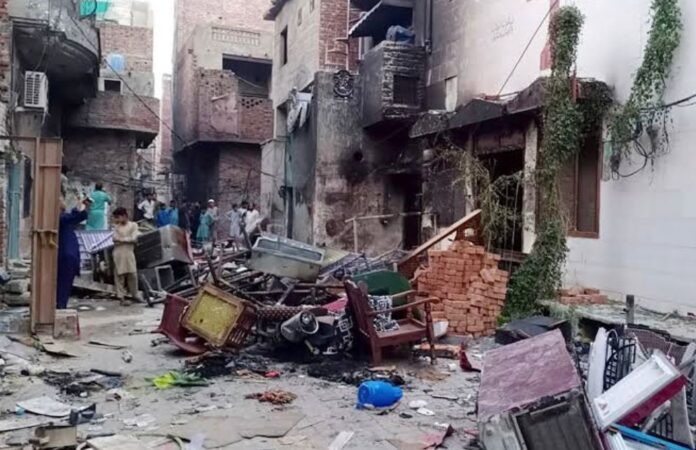In a shocking incident that unfolded in Jaranwala, Pakistan, a violent mob attack on churches and homes of minority Christians has resulted in the arrest of 129 suspects, according to officials. The incident, triggered by an alleged Qur’an desecration, has not only caused extensive damage to property but has also left the Christian community traumatized. As the authorities work to restore order and assist the affected individuals, this incident sheds light on the delicate balance between religious sensitivities and the need for social harmony.
The chaos erupted on a fateful Wednesday when news of the alleged desecration spread like wildfire in Jaranwala. The local community was inflamed, leading to a rampage that saw a dozen churches and almost two dozen Christian homes vandalized and torched by an angry mob. This incident of violence has been characterized as one of the most destructive attacks against Christians in the country. As the situation escalated, many Christians were forced to flee their homes in search of safer havens within the city.
In response to the escalating violence, authorities swiftly intervened by summoning soldiers to restore order and ensure the safety of the affected Christian residents. As the dust settled, scenes of devastation greeted the returning residents. The aftermath of the attack was heart-wrenching, with charred churches and homes bearing witness to the senseless destruction.
Police investigations led to the arrest of 129 individuals suspected of participating in the violent riot. Among the detainees were Raja Amir and a friend, who was accused by local Muslims of defacing the Qur’an and casting it to the ground after writing disparaging remarks on its pages. The regional police chief, Rizwan Khan, assured the public that the situation was now under control, providing a sense of relief to the traumatized Christian community.
The stories of those affected tell a harrowing tale of fear and loss. Shazia Amjad recounted how the mob descended upon her home, burning it to the ground and stealing precious possessions. Many others shared similar experiences, expressing bewilderment at the brutality they faced. While sitting outside his razed home, Azeem Masih pondered the senselessness of the attack, questioning why they had become victims when they had done no wrong.
The violence has elicited widespread condemnation, both within Pakistan and internationally. Caretaker Prime Minister Anwaarul-ul-Haq Kakar expressed his dismay at the situation and ordered the police to ensure that the culprits responsible for the violence were brought to justice. Videos and images circulated on social media showcased the ferocity of the attack, depicting churches being pelted with bricks and set ablaze, as well as individuals scaling church roofs to remove crosses.
Amid the calls for justice, human rights organizations have raised their voices against the backdrop of Pakistan’s blasphemy laws. Amnesty International has called for the repeal of these laws, citing their potential for misuse and incitement to violence. These laws have often been used to target religious minorities and settle personal vendettas, leading to intimidation, lynchings, and even killings.
Vedant Patel, a spokesperson for the US State Department, emphasized the importance of a thorough investigation into the incident. He highlighted the United States’ commitment to freedom of expression and the right to practice one’s religion without fear of persecution.
As Pakistan grapples with the aftermath of this shocking incident, it serves as a reminder of the fragility of religious harmony and the urgent need for social cohesion. The incident underscores the necessity for unbiased investigations, fair trials, and a reassessment of laws that can be manipulated to propagate violence. In these trying times, the world watches as Pakistan seeks to heal the wounds inflicted upon its minority communities and restore a sense of security and peace for all its citizens.


